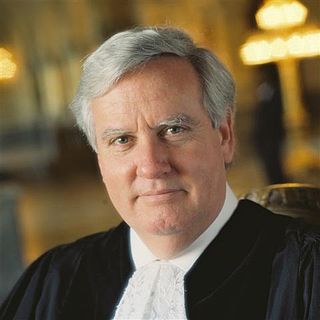Related Research Articles
International judicial institutions can be divided into courts, arbitral tribunals and quasi-judicial institutions. Courts are permanent bodies, with near the same composition for each case. Arbitral tribunals, by contrast, are constituted anew for each case. Both courts and arbitral tribunals can make binding decisions. Quasi-judicial institutions, by contrast, make rulings on cases, but these rulings are not in themselves legally binding; the main example is the individual complaints mechanisms available under the various UN human rights treaties.

The Mercedes-Benz Group AG is a German multinational automotive corporation headquartered in Stuttgart, Baden-Württemberg, Germany. It is one of the world's leading car manufacturers. Daimler-Benz was formed with the merger of Benz & Cie., the world's oldest car company, and Daimler Motoren Gesellschaft in 1926. The company was renamed DaimlerChrysler upon the acquisition of American automobile manufacturer Chrysler Corporation in 1998, and was again renamed Daimler AG upon divestment of Chrysler in 2007. In 2021, Daimler AG was the second-largest German automaker and the sixth-largest worldwide by production. In February 2022, Daimler was renamed Mercedes-Benz Group as part of a transaction that spun-off its commercial vehicle segment as an independent company, Daimler Truck.

Sindelfingen is a city in Baden-Württemberg in south Germany. It lies near Stuttgart at the headwaters of the Schwippe, and is home to a Mercedes-Benz assembly plant.

Karl Kling was a motor racing driver and manager from Germany. He participated in 11 Formula One Grands Prix, debuting on 4 July 1954. He achieved 2 podiums - the first German ever to achieve a Formula One podium - and scored a total of 17 championship points.
The International Centre for Settlement of Investment Disputes (ICSID) is an international arbitration institution established in 1966 for legal dispute resolution and conciliation between international investors and States. ICSID is part of and funded by the World Bank Group, headquartered in Washington, D.C., in the United States. It is an autonomous, multilateral specialized institution to encourage international flow of investment and mitigate non-commercial risks by a treaty drafted by the International Bank for Reconstruction and Development's executive directors and signed by member countries. As of May 2016, 153 contracting member states agreed to enforce and uphold arbitral awards in accordance with the ICSID Convention.
Bruno Simma is a German jurist who served as a judge on the International Court of Justice from 2003 until 2012.
In 1994 Guatemala's Commission for Historical Clarification - La Comisión para el Esclarecimiento Histórico (CEH) - was created as a response to the thousands of atrocities and human rights violations committed during the decades long civil war that began in 1962 and ended in the late 1990s with United Nations-facilitated peace accords. The commission operated under a two-year mandate, from 1997 to 1999, and employed three commissioners: one Guatemalan man, one male non-national, and one Mayan woman. The mandate of the commission was not to judge but to clarify the past with "objectivity, equity and impartiality."

Daimler-Motoren-Gesellschaft was a German engineering company and later automobile manufacturer, in operation from 1890 until 1926. Founded by Gottlieb Daimler (1834–1900) and Wilhelm Maybach (1846–1929), it was based first in Cannstatt. Daimler died in 1900, and their business moved in 1903 to Stuttgart-Untertürkheim after the original factory was destroyed by fire, and again to Berlin in 1922. Other factories were located in Marienfelde and Sindelfingen.
The doctrine and rules of state immunity concern the protection which a state is given from being sued in the courts of other states. The rules relate to legal proceedings in the courts of another state, not in a state's own courts. The rules developed at a time when it was thought to be an infringement of a state's sovereignty to bring proceedings against it or its officials in a foreign country.

Sir Christopher John Greenwood is Master of Magdalene College, Cambridge and a former British judge at the International Court of Justice. Prior to his election, he was professor of international law at the London School of Economics and a barrister who regularly appeared as counsel before the International Court of Justice, the European Court of Human Rights, the English courts, and other tribunals.
Georg Nolte is a German jurist and Judge of the International Court of Justice. He is professor of public international law at the Humboldt University of Berlin and has been a member of the UN's International Law Commission from 2007 to 2021, serving as its chairman in 2017. In November 2020 he was elected Judge of the International Court of Justice by the United Nations General Assembly and the Security Council, and he took office on 6 February 2021.
Mercedes-Benz, commonly referred to as Mercedes and sometimes as Benz, is a German luxury and commercial vehicle automotive brand established in 1926. Mercedes-Benz AG is headquartered in Stuttgart, Baden-Württemberg, Germany. Mercedes-Benz AG produces consumer luxury vehicles and light commercial vehicles badged as Mercedes-Benz. From November 2019 onwards, Mercedes-Benz-badged heavy commercial vehicles are managed by Daimler Truck, a former part of the Mercedes-Benz Group turned into an independent company in late 2021. In 2018, Mercedes-Benz was the largest brand of premium vehicles in the world, having sold 2.31 million passenger cars.
Xhezair Zaganjori is an Albanian lawyer and judge. He has served as the President of the Supreme Court of Albania since April 2013, after the termination of his term as a member of the Constitutional Court of Albania.

Antônio Augusto Cançado Trindade was a Brazilian jurist and international judge. He was appointed as judge of the International Court of Justice (ICJ) from 6 February 2009. He was reelected to the Court in December 2017, and took office for his second term on 6 February 2018, serving until his death in 2022.

The Mercedes-Benz W25 was a Grand Prix racing car designed by Daimler-Benz AG for the 1934 Grand Prix season, in which new rules were introduced, and no championship was held. In 1935, the European Championship was resumed, and it was won by Rudolf Caracciola in a W25. In modified form, the W25 remained in use until 1937, when it was succeeded by the Mercedes-Benz W125.
The Max Planck Institute for Comparative Public Law and International Law is a legal research institute located in Heidelberg, Germany. It is operated by the Max Planck Society.
Pierre-Marie Dupuy is a French jurist. Since 1981 he is a law professor at Panthéon-Assas University, of which he is on leave since 2000. From 2000 to 2008 he was Professor of International Law at the European University Institute in Florence. Since 2008 he works in the same capacity at the Graduate Institute of International and Development Studies in Geneva.

Dire Tladi is a professor of international law at the Department of Public Law and the Institute for International and Comparative Law in Africa at the University of Pretoria. He is also extraordinary professor at the Public Law Department of the University of Stellenbosch. He has served as the Principal State Law Adviser for International Law for the South African Department of International Relations and Cooperation and Legal Counsellor to the South Africa Mission to the United Nations.
Daimler AG v. Bauman, 571 U.S. 117 (2014), is a United States Supreme Court case in which the Court answered whether an American court may exercise jurisdiction over a foreign company based on the fact that a subsidiary of the company acts on its behalf in the jurisdictional state. The court held that an American company cannot be sued for conduct occurring outside the United States and American courts do not have jurisdiction of such a claim.
References
- ↑ "Mercedes cleared over abuses in Argentina" . Retrieved 2017-11-29.
- ↑ "Daimler accused of aiding Argentina repression". MinnPost. Retrieved 2017-11-29.
- ↑ "Germany institutes proceedings against Italy for failing to respect its jurisdictional immunity as a sovereign State" (PDF). Icj-cij.org. Archived from the original (PDF) on 2015-09-24. Retrieved 2015-12-05.
- ↑ "New President of OSCE Court of Conciliation and Arbitration elected". OSCE. 2013-12-17. Retrieved 2015-12-05.